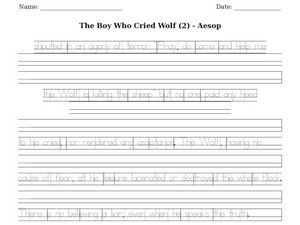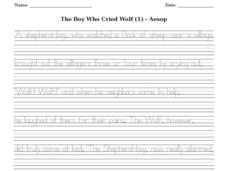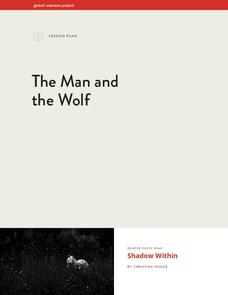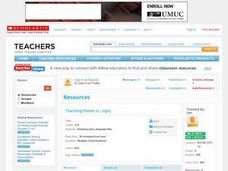Read Works
The Boy Who Cried Wolf
Reinforce reading comprehension strategies and contemplate an important life lesson with a activity featuring Aesop's fable, The Boy Who Cried Wolf. After reading a brief passage, scholars show what they know by way of five...
Curated OER
The Boy Who Cried Wolf
Second graders listen to the story, THE BOY WHO CRIED WOLF and in pairs, discuss the theme of the book and two things that they liked about it. They then read the book OOPS and discuss the theme of the book identifying the things they...
Curated OER
The Boy Who Cried Wolf (2) - Aesop
In this The Boy Who Cried Wolf worksheet, students read the passage and then trace and write the story about the boy who cried wolf. Students trace and write 5 lines total.
Curated OER
The Boy Who Cried Wolf (1) - Aesop
In this trace and write learning exercise, students trace and write sentences about The Boy Who Cried Wolf. Students trace and write 5 lines.
Curated OER
The Bo Who Cried Wolf
In this story worksheet, students read "The Boy Who Cried Wolf," then answer discussion, comprehension and extension questions and do simple research on shepherds.
Curated OER
The Boy Who Cried Wolf!
Students use fables to learn about trustworthiness and character education. In this trust lesson, students discuss the fable of the boy who cried 'Wolf' and discuss the importance of telling the truth. Students answer the discussion...
Core Knowledge Foundation
Fables and Stories Tell It Again!™ Read-Aloud Anthology
A read-aloud anthology focuses on fables. Over three weeks, first graders listen to various stories and then participate in lessons that cover story elements, including plot, characters, setting, and personification and explore...
K5 Learning
The Wolf
Fourth graders have likely heard the expression to cry wolf, but they may not know the saying's origin. A short reading passage tells the story and includes four comprehension questions for pupils to demonstrate their understanding.
Global Oneness Project
The Man and the Wolf
Human attitudes toward the big bad wolf come into focus in a photo essay that asks viewers to consider their own feelings about the endangered species.
Curated OER
What Difference Do Good and Bad Make?
Learners discuss the characteristics of good citizenship, listen to the story, The Boy Who Cried Wolf, and develop and present skits demonstrating examples of good and bad behaviors.
Curated OER
Aesop's Fables
Regale your class with renditions of Aesop's fables from the engaging, and beautifully illustrated book by Jerry Pinkney. Guide discussion to practice prediction, compare and contrast various stories, explore the connections between the...
Curated OER
Introduction to Myths, Fables, and Legends
Middle schoolers identify elements of myths, fables, and legends as they read an example of each. After reading an example of each type of story, they list elements from each. They compare and contrast these features by completing a...
Curated OER
All About Aesop
First graders explore the genre of fables. For this fables lesson, 1st graders use various reading strategies to raise comprehension skills. Students make prediction and complete a prediction journal. Students understand that fables...
Curated OER
Folktales: A Cultural Teaching Tool
Students demonstrate an understanding that folktales carry underlying themes through writing sentences explaining some of the themes presented in several folktales.
Curated OER
Why Mosquitoes Buzz in People's Ears
Students find themes in folktales. For this folktale lesson, students read different folktales from Africa to find what message the author wants the reader to learn. They read "Why Mosquitoes Buzz in People's Ears" by Verna Aardema,...
Curated OER
Language Arts: Retelling Leo the Longhorn
Pupils reinforce sequencing skills by retelling stories. After being assigned roles in the production, they create dialog, props, and costumes for retelling the story "Leo the Longhorn." Working in cooperative groups, students may also...
Curated OER
Theme vs. Topic
Students use Aesop's fables to examine theme and topic. In this theme and topic lesson, students read different fables and discussing as a class. After hearing more stories students work in pairs to determine the theme or topic.
Curated OER
Do-deca-he-dron-It's Greek to Me!
Learners create a dodecahedron shaped visual report of the literary elements of a short story.
Curated OER
Storytelling
Students explore the origins of folktales, fairytales, myths, legends, fables, and folktales in the ten lessons of this unit. A storytelling festival is held to feature the results of the variety of activities presented in the unit.
Curated OER
Wild Children 1
In this Romulus and Rebus interactive exercise, students read a short passage about Rome and how it was built. Students answer questions, fill in the blanks and complete a writing activity in an interactive format based on the reading.
Curated OER
Cloze Exercise: Romulus and Remus
In this cloze exercise worksheet, learners enter words in the boxes to complete sentences in a paragraph. The paragraph contains the story of Romulus and Remus.






















